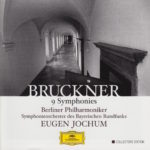 This morning’s conductor of Anton Bruckner’s unfinished Symphony No. 9 in D Minor WAB 109 (dedicated “to the beloved God”) is German-born Eugen Jochum (1902-1987), unarguably one of the most highly respected interpreters of Anton Bruckner’s music who ever lived.
This morning’s conductor of Anton Bruckner’s unfinished Symphony No. 9 in D Minor WAB 109 (dedicated “to the beloved God”) is German-born Eugen Jochum (1902-1987), unarguably one of the most highly respected interpreters of Anton Bruckner’s music who ever lived.
His orchestra for this performance is the Berliner Philharmoniker
I have two CD box sets featuring Maestro Jochum – this one, on the DG label (which I call the “White Box”), and another on the Warner Classics label (which I call the “Green Box”). I chose to listen to the symphony from the DG set first because the recordings are older. (I figured alpha by conductor, then by chronological order of the date of the recording was a fair enough delineator.)
As a reminder, this is from the Wikipedia entry for Jochum:
Jochum was born to a Roman Catholic family in Babenhausen, near Augsburg, Germany; his father was an organist and conductor. Jochum studied the piano and organ in Augsburg, enrolling in its Academy of Music from 1914 to 1922. He then studied at the Munich Conservatory, with his composition teacher being Hermann von Waltershausen; it was there that he changed his focus to conducting, his teacher being Siegmund von Hausegger, who conducted the first performance of the original version of the Ninth Symphony of Anton Bruckner and made the first recording of it.
Regarding his podium technique, Kenneth Woods blogs, “Look at his hands — very small and focused motions but so powerful.” Woods also states that “his sense of rubato, while still incredibly daring, is perhaps more un-erring than [that of] even Wilhelm Furtwängler.”
Jochum’s older brother Otto Jochum (1898–1969) was a composer and choral conductor; his younger brother Georg Ludwig Jochum (1909–1970) was, like Jochum, an orchestral conductor. His daughter Veronica Jochum is a pianist on the faculty of the New England Conservatory of Music in Boston, Massachusetts.
Jochum died in Munich in 1987, at the age of 84. His wife Maria predeceased him, in 1985.
So far, I’ve been privileged to hear 16 (!) performances conducted by Maestro Jochum – eight from the “White Box” and right from the “Green Box.” As I’ve discovered, I prefer one of those box sets over the other. But I’ll save the subjective stuff for later.
I first encountered Eugen Jochum in my 144-day project on Day 6, Symphony No. 1 (White Box)
Then again on Day 22, Symphony No. 2 (White Box).
Then again on Day 38, Symphony No. 3 (White Box).
Then again on Day 54, Symphony No. 4 (White Box).
Then again on Day 70, Symphony No. 5 (White Box).
Then again on Day 86 Symphony No. 6 (White Box).
Then again on Day 102, Symphony No. 7 (White Box).
Then again, most recently, on Day 118, Symphony No. 8 (White Box).
First, just the facts:
 Bruckner’s Symphony No. 9 in D Minor WAB 109, composed 1887-1896.
Bruckner’s Symphony No. 9 in D Minor WAB 109, composed 1887-1896.
Eugen Jochum conducts
Jochum used the ??? version edited by ???
Berliner Philharmoniker plays
The symphony clocks in at 60:49
This was recorded in Berlin, Germany, in December of 1964
Jochum was 62 when he conducted it
Bruckner was 72 when he died before finishing the Ninth
This recording was released on the Deutsche Grammophon (DG) label
Bruckner wrote his symphonies in four parts. He would have this time, too. But he died before completing movement four. The time breakdown of this one (Symphony No. 9 in D Minor), from this particular conductor (Jochum) and this particular orchestra (Berliner Philharmoniker) is as follows:
I. Feierlich, misterioso (D minor)…………………………………………………………………23:19
II. Scherzo. Bewegt, lebhaft (D minor); Trio. Schnell (F-sharp major)…………………………………………………………………………………………………………….9:49
II. Adagio. Langsam, feierlich (E major)……………………………………………………….27:41
IV. Finale. (D minor, incomplete)……………………………………………………………………0:00
Total running time: 60:49
Now, for the subjective aspects:
My Rating:
Recording quality: 5
Overall musicianship: 5
CD liner notes: 4 (includes two superb essays, one by Jochum)
How does this make me feel: 5
Another “Huzzah!” performance from Maestro Jochum!
Despite the age of this recording (over half a century!), this sounds as crisp, clear, and powerful as if it had been recorded last week.
I was drawn in from the opening notes, and held spellbound throughout.
The Scherzo was a little less powerful than I’ve heard in other performances.
But the sublime Adagio more than made up for it.
A well-recorded, well-balanced, magical performance.
Thank you, Maestro Jochum and the members of the Berliner Philharmoniker.
